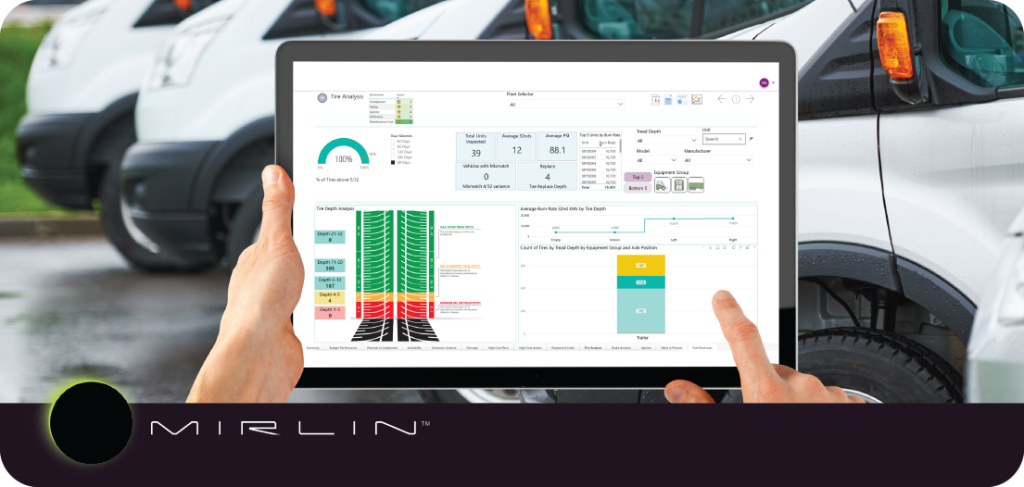MIRLIN BLOG
Revolutionizing Fleet Management: The Power of Data-Driven Preventative Maintenance
In the realm of fleet management, maintaining a healthy and efficient fleet is crucial for ensuring operational success and minimizing downtime. Traditional maintenance approaches often rely on routine schedules or reactive fixes, which can be costly and inefficient. However, a paradigm shift is underway with the advent of predictive maintenance powered by advanced technologies. Let’s explore how predictive maintenance is shaping the future of vehicle fleet management and revolutionizing maintenance practices.

The Evolution from Reactive to Predictive Maintenance
Reactive Maintenance: Historically, fleet maintenance has been reactive—waiting for equipment to fail before repairs are made. This approach can lead to unexpected breakdowns, increased downtime, and higher repair costs.
Preventive Maintenance: Recognizing the limitations of reactive strategies, fleet managers adopted preventive maintenance schedules based on manufacturer recommendations. While proactive, this approach can be inefficient, as maintenance is often performed on a fixed schedule rather than based on actual equipment condition.
Predictive Maintenance: Predictive maintenance takes fleet management to the next level by leveraging data analytics, machine learning, and IoT (Internet of Things) sensors to predict equipment failures before they occur. By analyzing real-time data from vehicles and components, fleet managers can identify patterns and anomalies that signal potential issues, allowing for timely intervention and optimized maintenance.
How Predictive Maintenance Works
Data Collection: Sensors installed in vehicles collect a wealth of operational data, including engine performance, temperature, fuel consumption, mileage, and more.
Data Analysis: Advanced algorithms analyze this data in real-time to detect patterns, trends, and deviations from normal operating conditions.
Predictive Modeling: Machine learning models use historical data to predict when components are likely to fail or require maintenance. These models continuously learn and improve accuracy over time.
Alerts and Notifications: When anomalies or potential issues are detected, the system generates alerts and notifications for proactive maintenance actions.
Benefits of Predictive Maintenance in Fleet Management
Minimized Downtime
By addressing maintenance issues before they escalate, predictive maintenance reduces unplanned downtime and keeps vehicles on the road.
Cost Savings
Predictive maintenance optimizes repair schedules, reduces parts and labor costs, and extends the lifespan of fleet assets.
Improved Reliability
Regular monitoring and timely repairs enhance vehicle safety and reliability, reducing the risk of accidents and breakdowns.
Optimized Fleet Performance
Predictive maintenance contributes to overall fleet performance by ensuring vehicles operate at peak efficiency and compliance.
Enhanced Safety
Real-time data allows for the monitoring of driver behavior, ensuring adherence to safety protocols. Fleet managers can intervene promptly if any risky behavior is detected, thus reducing the likelihood of accidents.
Optimized Routes
By analyzing historical data, fleets can optimize routes based on traffic patterns, weather conditions, and delivery schedules. This not only saves time but also reduces fuel consumption and emissions, contributing to environmental sustainability.
Predictive Analytics
Data analysis enables the prediction of equipment failures before they occur. By identifying patterns in vehicle performance data, fleet managers can schedule preventative maintenance, thus avoiding costly breakdowns and unexpected downtime.

Preventative Maintenance: Ensuring On-Road Reliability
Preventative maintenance is the cornerstone of a successful fleet management strategy. Instead of waiting for vehicles to break down, scheduled maintenance tasks are performed based on data insights and manufacturers’ recommendations.
This proactive approach offers several advantages:
Increased Reliability: Regular maintenance minimizes the risk of sudden breakdowns, ensuring that vehicles operate smoothly and reliably. This reliability is crucial, especially for time-sensitive deliveries and services.
Extended Vehicle Lifespan: Routine maintenance, such as oil changes, brake inspections, and tire rotations, significantly extends the lifespan of vehicles. This not only saves costs on premature replacements but also maximizes the ROI of the fleet.
Cost Efficiency: Addressing issues before they escalate into major problems is far more cost-effective. Preventative maintenance reduces the need for costly repairs, making budgeting more predictable and manageable.
The synergy of measuring and collecting data at the source, coupled with proactive preventative maintenance, marks a paradigm shift in fleet management. By harnessing the power of real-time insights and predictive analytics, fleet managers can create safer, more efficient, and cost-effective operations. Embracing this data-driven approach isn’t just a choice; it’s a necessity in the competitive landscape of modern fleet management.
Mirlin Wiz
The Mirlin Wiz is a spokesperson for Mirlin Technologies. With over two decades in fleet maintenance, The Mirlin Wiz understands the complexity of the industry. Armed with cutting-edge technology, Mirlin is introducing a new approach to embracing these technology trends, including an innovative end-to-end technology platform. ‘The Wiz’ is excited to inform you about Mirlin Technologies New Era approach to fleet management and and maintenance!

Smart Orchestration Is the New Competitive Advantage for Fleet Leaders
Fleet management technology is evolving faster than ever, but the biggest competitive advantage for modern fleets isn’t a new dashboard, telematics device, or maintenance system. It’s the ability to connect and orchestrate the systems you already have.

Mirlin Technologies Recognized by 2025 CIO Awards Canada
Mirlin Technologies is proud to announce it has been named one of the recipients of the prestigious 2025 CIO Awards Canada, presented by International Data Corporation (IDC) Canada and CIO. This national recognition celebrates Mirlin’s groundbreaking work in delivering AI-powered business solutions that are reshaping the transportation industry and driving measurable value across sectors.

Fleet Optimization in Focus | Mirlin Technologies at MCE 2025
Discover how Mirlin Technologies showcased its AI-powered fleet optimization platform at MCE 2025. Learn how predictive maintenance, data orchestration, and automated processes transform fleet management through an intelligent, connected ecosystem.
